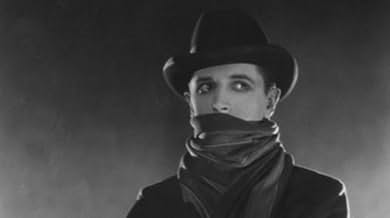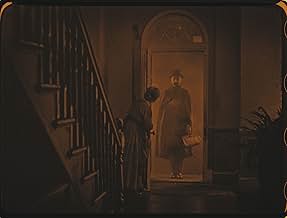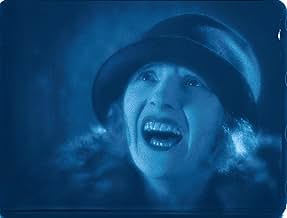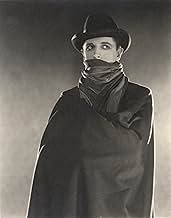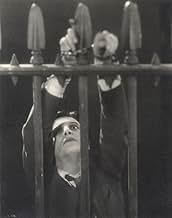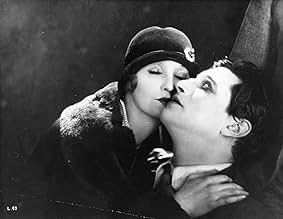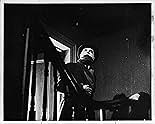IMDb RATING
7.3/10
14K
YOUR RATING
A landlady suspects that her new lodger is the madman killing women in London.A landlady suspects that her new lodger is the madman killing women in London.A landlady suspects that her new lodger is the madman killing women in London.
June Tripp
- Daisy - A Mannequin
- (as June)
Wallace Bosco
- Pub Customer
- (uncredited)
Daisy Campbell
- Mother
- (uncredited)
Maudie Dunham
- First Victim
- (uncredited)
Reginald Gardiner
- Dancer at Ball
- (uncredited)
Eve Gray
- Showgirl Victim
- (uncredited)
Alfred Hitchcock
- Extra in Newspaper Office
- (uncredited)
Alma Reville
- Woman Listening to Wireless
- (uncredited)
Featured reviews
This is the first real Hitchcock movie. The one in which he really starts to use all his abilities, although we can see that they are still not mature yet. It's very interesting because he makes a lot of experiments in this film, like the glass ceiling, and we see how hard he wanted, at the time, to really make his mark, to stand above the rest. Although the ending is not very good, the first 20 minutes of The Lodger are impressive, with Hitchcock slowly telling us (visually, of course) about the killer and his particularities, until the arrival of Ivor Novello. A must-see picture to any real Hitchcock fan
The Lodger (1927)
This is the first of three movies in a 30 year period based on the same plot, and in terms of plot this is the best of them. (There is also a recent one that is the worst of the bunch.) It is, for sure, an early Alfred Hitchcock film. It's early in the sense that it's still creaky at times. It's Hitchcock because it's tightly made, visually dramatic, and it combines sympathy and suspense really well.
If you are into what makes Hitchcock tick, you really have to see this movie. Not that you should mind--it's great stuff. First of all you get the presumably innocent man accused of a string of murders (this is ambiguous). Then you have the mixing of sex and murder (or lust and murder--there is no sex here). And then you have the way Hitchcock mixes every day regular people and very safe and homey situations with genuine terrible murderous events. And finally there is his filming and editing.
Take a look even at the very first shot--a close up a screaming woman shot at an angle (a "Dutch angle"). Look next at how dark and impressionistic the next shots are of a horrified crowd, a cop, and a reporter. Later there are other interesting cuts to lead you to thinking a certain way about the characters. And the overlapping of images. And the shot of a man walking overhead on glass, as if you can see through the ceiling.
The humor and clever conversation of later versions of this story are naturally lost on us here. Also in good Hitch fashion there are few intertitle cards. Good thing. The visuals tell the story. And wait until the final scenes, the Pieta all over again, really gorgeous. Some of these last shots were redone at the request of the studio to change the impressions of the main character, a handsome man with an acting reputation to protect. Hitchcock went along, and it seems to be acceptable all around by the time it was released.
It's hard to find a decent "print" of this (a version from a good copy of the film, on DVD or streaming), but it has recently been restored and re-scored (orchestrated) and that's for sure the one to get. It is so far only a U.K. release, apparently even a blu-ray version is out (look for the red and black Constructivist cover). Criterion has not released a version. The original release has different scenes tinted blue or amber for greater effect and the usual version on Hitchcock DVDs and DVD sets in the U.S. is all black and white.
So, if you don't like silent films and can't stand choppy or grainy or badly cropped releases of early films, don't see this. But if you can find the clean new restoration, or you just love Hitchcock, or if you really like silent films (they get more and more amazing the more you see), then see this! It's the director's first really characteristic feature.
This is the first of three movies in a 30 year period based on the same plot, and in terms of plot this is the best of them. (There is also a recent one that is the worst of the bunch.) It is, for sure, an early Alfred Hitchcock film. It's early in the sense that it's still creaky at times. It's Hitchcock because it's tightly made, visually dramatic, and it combines sympathy and suspense really well.
If you are into what makes Hitchcock tick, you really have to see this movie. Not that you should mind--it's great stuff. First of all you get the presumably innocent man accused of a string of murders (this is ambiguous). Then you have the mixing of sex and murder (or lust and murder--there is no sex here). And then you have the way Hitchcock mixes every day regular people and very safe and homey situations with genuine terrible murderous events. And finally there is his filming and editing.
Take a look even at the very first shot--a close up a screaming woman shot at an angle (a "Dutch angle"). Look next at how dark and impressionistic the next shots are of a horrified crowd, a cop, and a reporter. Later there are other interesting cuts to lead you to thinking a certain way about the characters. And the overlapping of images. And the shot of a man walking overhead on glass, as if you can see through the ceiling.
The humor and clever conversation of later versions of this story are naturally lost on us here. Also in good Hitch fashion there are few intertitle cards. Good thing. The visuals tell the story. And wait until the final scenes, the Pieta all over again, really gorgeous. Some of these last shots were redone at the request of the studio to change the impressions of the main character, a handsome man with an acting reputation to protect. Hitchcock went along, and it seems to be acceptable all around by the time it was released.
It's hard to find a decent "print" of this (a version from a good copy of the film, on DVD or streaming), but it has recently been restored and re-scored (orchestrated) and that's for sure the one to get. It is so far only a U.K. release, apparently even a blu-ray version is out (look for the red and black Constructivist cover). Criterion has not released a version. The original release has different scenes tinted blue or amber for greater effect and the usual version on Hitchcock DVDs and DVD sets in the U.S. is all black and white.
So, if you don't like silent films and can't stand choppy or grainy or badly cropped releases of early films, don't see this. But if you can find the clean new restoration, or you just love Hitchcock, or if you really like silent films (they get more and more amazing the more you see), then see this! It's the director's first really characteristic feature.
This movie is fantastic and fascinating mostly because of its director, but it would be fun either way. I'd say that it's better than many films of the same period, but not to the same extreme degree that Hitchcock's movies eventually achieved.
You can see it's his work, though. Hitchcock knew that what made a suspenseful movie good had nothing to do with gore or loud noises, and this shows even in his early work. The Lodger has a distinctly Hitchcock feel to it--fun and scary--and it's interesting to see how he gets around the lack of sound, considering the fact that most (all?) of his other films were talkies.
You can see it's his work, though. Hitchcock knew that what made a suspenseful movie good had nothing to do with gore or loud noises, and this shows even in his early work. The Lodger has a distinctly Hitchcock feel to it--fun and scary--and it's interesting to see how he gets around the lack of sound, considering the fact that most (all?) of his other films were talkies.
The Lodger was the feature which Hitchcock himself described as his first true film (it was actually his third complete one), and film historians, particularly auteurists tend to focus upon it because it is it introduces themes of murder and suspense that Hitch's name would later be synonymous with.
To be honest, the first thing that strikes me upon watching The Lodger is its sense of rhythm. Hitchcock's earliest films were always very rhythmic and the opening moments of The Lodger are a great example, with a dynamic and attention grabbing sequence of shots and title cards. Much of this however may be down to the style of the seldom referenced screenwriter Eliot Stannard, who has a credit on all but one of Hitchcock's silents. Stannard was a master at telling stories in purely visual terms, and his screenplays often go as far as to map out series of interlocking images.
The next very obvious thing about The Lodger is that right from the start Hitchcock was more interested in cinematic technique than he was in performances or artistry. The Lodger is crammed with Expressionist effects, in particular double exposures. Hitch clearly hadn't learnt the art of subtlety yet and these are massively overused. We can also tell early on that Hitchcock was interested in using his camera to involve the audience in the film, throwing in point-of-view shots or drawing our attention to specific items. In this regard his technique was not yet refined. He was develop it in his later silents.
Of course what generally interests followers of Hitchcock's career is the fact that The Lodger is the first time he deals with the grisly subject of murder. It's true that there are many Hitchcockian elements here murder, blondes, a love triangle and even a MacGuffin in the form of the Avenger whom all the characters are concerned about but isn't the focus of the story. There is a kind of morbid sensationalism concerning the killings, something we'd see right through to the other end of Hitch's career with the comment about "ripped whores" in 1972's Frenzy. There's also of course a "wrong man", although here he appears more as the subject of a whodunit. The later Hitchcock would have focused upon the plight of the wrongly accused, and made a more suspenseful film in the process.
All in all, The Lodger isn't really as significant an early Hitchcock as some would believe. For one thing there is the influence of screenwriter Stannard and the fact that Hitchcock, although he may have relished the material, was still very young and inexperienced. The fact is The Lodger may contain more of Stannard's influence than it does Hitchcock's. It's not as if Hitchcock immediately began making more murder thrillers. The majority of his British thrillers are of the espionage/adventure variety, and it would take up until the early 40s for Hitchcock to really begin making masterpieces in the domestic murder genre. It's also nowhere near being Hitch's best silent film, even though it tends to be remembered over more polished works like The Ring and The Manxman. Taken out of context though, it is a fairly decent late silent thriller, with only a few minor flaws in plot and direction.
To be honest, the first thing that strikes me upon watching The Lodger is its sense of rhythm. Hitchcock's earliest films were always very rhythmic and the opening moments of The Lodger are a great example, with a dynamic and attention grabbing sequence of shots and title cards. Much of this however may be down to the style of the seldom referenced screenwriter Eliot Stannard, who has a credit on all but one of Hitchcock's silents. Stannard was a master at telling stories in purely visual terms, and his screenplays often go as far as to map out series of interlocking images.
The next very obvious thing about The Lodger is that right from the start Hitchcock was more interested in cinematic technique than he was in performances or artistry. The Lodger is crammed with Expressionist effects, in particular double exposures. Hitch clearly hadn't learnt the art of subtlety yet and these are massively overused. We can also tell early on that Hitchcock was interested in using his camera to involve the audience in the film, throwing in point-of-view shots or drawing our attention to specific items. In this regard his technique was not yet refined. He was develop it in his later silents.
Of course what generally interests followers of Hitchcock's career is the fact that The Lodger is the first time he deals with the grisly subject of murder. It's true that there are many Hitchcockian elements here murder, blondes, a love triangle and even a MacGuffin in the form of the Avenger whom all the characters are concerned about but isn't the focus of the story. There is a kind of morbid sensationalism concerning the killings, something we'd see right through to the other end of Hitch's career with the comment about "ripped whores" in 1972's Frenzy. There's also of course a "wrong man", although here he appears more as the subject of a whodunit. The later Hitchcock would have focused upon the plight of the wrongly accused, and made a more suspenseful film in the process.
All in all, The Lodger isn't really as significant an early Hitchcock as some would believe. For one thing there is the influence of screenwriter Stannard and the fact that Hitchcock, although he may have relished the material, was still very young and inexperienced. The fact is The Lodger may contain more of Stannard's influence than it does Hitchcock's. It's not as if Hitchcock immediately began making more murder thrillers. The majority of his British thrillers are of the espionage/adventure variety, and it would take up until the early 40s for Hitchcock to really begin making masterpieces in the domestic murder genre. It's also nowhere near being Hitch's best silent film, even though it tends to be remembered over more polished works like The Ring and The Manxman. Taken out of context though, it is a fairly decent late silent thriller, with only a few minor flaws in plot and direction.
... a thriller based on the book by Marie Belloc Lowndes. A mysterious killer known as "the Avenger" is terrorizing the streets of London. He targets women with blonde, curly hair, and the police are at a loss to stop him. Meanwhile, a sketchy new lodger (Ivor Novello) takes up residence in the rooming house of a landlady (Marie Ault) and her husband (Arthur Chesney). The landlady becomes convinced that the lodger is really the Avenger, which proves problematic as the lodger has caught the attention of the landlady's daughter, Daisy (June Tripp). Also featuring Malcolm Keen as Daisy's policeman boyfriend.
Inspired by the Jack the Ripper case, this was Hitchcock's first suspense picture, and was an immediate success, with one critic at the time even calling this the "best British film ever made". This is my second time watching it, and the first time watching the beautiful BFI restoration. The quality of the print is outstanding, and the commissioned score is excellent. Hitchcock uses a number of visually impressive double exposure shots, and I also liked the stylized intertitles. I still find the movie a tad too long, and Novello, who looks striking, is a silent-era-style ham, but it's still worth checking out for silent film fans. Arthur Chesney, playing the landlord, was the lookalike younger brother of Edmund Gwenn, and the former husband of Estelle Winwood.
Inspired by the Jack the Ripper case, this was Hitchcock's first suspense picture, and was an immediate success, with one critic at the time even calling this the "best British film ever made". This is my second time watching it, and the first time watching the beautiful BFI restoration. The quality of the print is outstanding, and the commissioned score is excellent. Hitchcock uses a number of visually impressive double exposure shots, and I also liked the stylized intertitles. I still find the movie a tad too long, and Novello, who looks striking, is a silent-era-style ham, but it's still worth checking out for silent film fans. Arthur Chesney, playing the landlord, was the lookalike younger brother of Edmund Gwenn, and the former husband of Estelle Winwood.
Did you know
- TriviaFor the opening of this movie, Sir Alfred Hitchcock wanted to show the Avenger's murder victim being dragged out of the Thames River at night with the Charing Cross Bridge in the background, but Scotland Yard refused his request to film at the bridge. Hitchcock repeated his request several times, until Scotland Yard notified him that they would "look the other way" if he could do the filming in one night. Hitchcock quickly sent his cameras and actors out to Charing Cross Bridge to film the scene, but when the rushes came back from the developers, the scene at the bridge was nowhere to be found. Hitchcock and his assistants searched through the prints, but could not find it. Finally, Hitchcock discovered that his cameraman had forgotten to put the lens on the camera before filming the night scene.
- GoofsWhen The Lodger (Ivor Novello) and Daisy (June Tripp) are playing chess, but the board is set up inappropriately. The square in the right corner should always be white. In this case, the bottom-right square is dark (black). This is the most obvious when The Lodger (Ivor Novello) is poking the coals in the fireplace.
- Quotes
Joe Betts: Does this lodger of yours mean any harm to Daisy?
The Landlady: Don't be silly, Joe. He's not that sort. Even if he's a bit queer, he's a gentleman.
- Crazy creditsClosing credits: Thank you to everyone who supported the BFI's Silent Hitchcock restoration project.
- Alternate versionsThe original version of The Lodger directed by Alfred Hitchcock in 1926 was restored in 1999 in honor of the directors 100th anniversary. The film was restored by the British National Film & TV Archives and a new score by Ashley Irwin was commissioned by ZDF/ARTE (Germany) and premiered on August 13, 1999 (what would have been Hitchcock's 100th birthday).
- ConnectionsEdited into Histoire(s) du cinéma: Une vague nouvelle (1999)
Details
Box office
- Budget
- £12,000 (estimated)
- Gross worldwide
- $83,568
- Runtime
- 1h 32m(92 min)
- Color
- Sound mix
- Aspect ratio
- 1.33 : 1
Contribute to this page
Suggest an edit or add missing content


